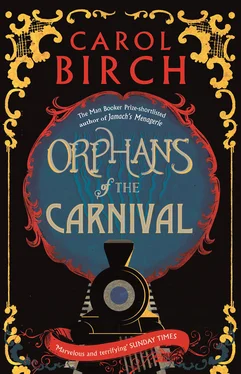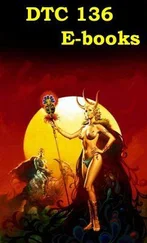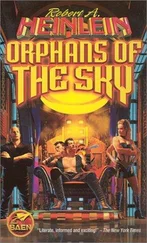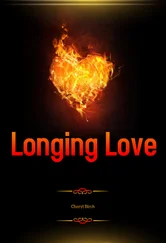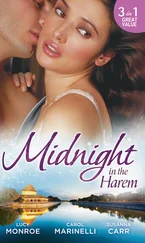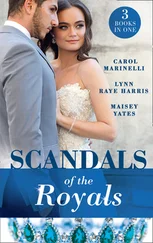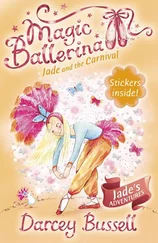‘Dobryj dyen,’ said Julia brightly to assuage the effect of her thoroughly veiled condition. ‘Parles tu français, ma chérie?’
‘Oui, Madame,’ the child replied gravely.
Liliya had said the fortune-teller spoke good French but no English.
‘I’d like to make an appointment to see Madame Pankova,’ Julia continued in French.
‘Un moment,’ said the child, withdrawing into the shadowy hall and disappearing into a room at the back. Now that she was here, Julia felt silly. Of course Theo was right. You couldn’t be on the road any length of time and remain unaware of the artifice involved in this kind of thing, but still, she thought. Now and again you got an exception. She had no doubt whatsoever that the gift existed and that one or two people had it, you just had to weed them out from the rest. She heard voices, the child’s and another that cracked and croaked. In a minute or so the girl came back. ‘If you can wait twenty minutes or so,’ she said, ‘she’ll see you now,’ and showed her into a small sitting room with a cheerful fire, comfortable chairs, a samovar on the sideboard and a tall unlit white candle in the centre of a round table. Madame Pankova had just seen another client and needed time to re-muster her strength, the girl said with the air of someone much older who’d said the same thing many times. She took Julia’s money, asked her to please sit, then poured tea and politely offered the cup, raising her large grey eyes to where Julia’s would have been.
‘Merci,’ said Julia, amused by the child’s official air.
There was a slight hesitation, a flicker of time when it seemed the girl was going to say something more, perhaps ask a question, but it passed and with a solemn bow she turned and left the room, leaving the door open. The sound of dishes being washed came from somewhere down the hall. A bell rang far away in the city, a steady, listless tolling. There was a poster of Paris on the wall, and the wallpaper had a pattern of coiled ferns.
Madame Pankova entered twenty-five minutes later from an inner room, a short fat woman in a dark blue dress, leaning heavily on a stick. ‘I have constant pain,’ she said by way of a greeting, ‘constant pain. Nothing can be done about it.’
‘I’m so sorry,’ said Julia.
‘Nothing to be sorry about. Yeva!’
She sat down in a high wing-backed chair, resting her stick by its side. The girl appeared and set about what was obviously a familiar routine of putting a battered footstool under Madame Pankova’s black-buttoned boots, which were tied up with indigo ribbons in floppy bows. She lit the tall white candle in the centre of the table, placed a worn deck of playing cards next to it, drew the curtains to shut out daylight, and withdrew as quietly as she’d come, closing the door behind her.
‘Well,’ croaked Madame Pankova, ‘ you’re a mystery woman. Are you going to take that veil off?’
‘No.’
‘Why not?’
‘I never do.’
Madame Pankova sighed heavily. She was a swarthy woman with long white hair hanging down under a red handkerchief. She sighed again, looked away, blew out her cheeks in a rude kind of way and looked back. ‘What do you want to know?’ she asked.
‘Can I ask anything?’
‘Anything at all.’
Julia thought for a few seconds then said, ‘Does my husband love me?’
Madame Pankova drank some tea. ‘Don’t you know?’
‘I think he does.’
Madame Pankova held up her finger for silence, stared expressionlessly for several minutes at the dark shape before her. At last she leaned forward, wincing and gasping softly as she did so, picked up the pack of cards and shoved them across the table.
‘Shuffle,’ she said.
Julia shuffled with thinly gloved fingers.
‘You’re not taking your gloves off to shuffle? Don’t want your palm read?’
‘No. Just the cards please,’ Julia said.
Madame Pankova nodded.
‘Is that enough?’ Julia asked.
‘Is it?’
‘I don’t know.’
Madame Pankova shrugged and looked away as if she’d lost interest.
‘There,’ said Julia, ‘that’s enough,’ and laid down three cards as commanded. They meant nothing to her. There was the ace of spades and the kings of spades and clubs.
‘One more,’ said Madame Pankova.
The nine of hearts.
Madame Pankova stared at the cards blankly for a few minutes, then said, ‘This is a mess,’ and after a longish pause, ‘You’re having a boy.’
Julia started.
Madame Pankova leaned over with her eyes closed and her head in her hands. Her fingernails were violet, long and thin like talons.
‘Your boy is a traveller.’
She sat back, opened her eyes and drank some tea.
Julia’s heart was a distant pounding in her throat and wrists. The blood came and went, not always regular. She hadn’t seen it in a while. Why hadn’t they thought about this? What, was it too impossible to think about?
‘Can you tell me,’ asked Julia, trying not to seem surprised, ‘will my baby take after his mother or his father?’
Madame Pankova slopped her tea with a shaky hand. How old the hand was, older than the rest of her, a shrivelled, shiny-veined whitening chicken claw. ‘Both of you,’ she said. The hand scooped up the cards and shuffled them expertly back into the deck.
‘Shuffle again.’
The second spread was bigger and mostly diamonds and spades. ‘Yes,’ said Madame Pankova. ‘He does. Your husband.’ Three or four vague meandering forgettables later — it appeared there was some trouble ahead but this would pass and peace would be restored — she suddenly said, ‘Your mother is watching over you. She is saying, you are mine .’
‘My mother?’
‘You are mine. You are mine . She watches.’
Dead, then.
Of course.
The room was too hot. The fortune-teller pointedly consulted a small watch on the end of a purple ribbon that she drew from a pocket. ‘One more question,’ she said.
‘One more,’ repeated Julia softly, ‘one more.’
‘Come, come,’ said Madame Pankova.
The sound of seagulls passed over the street and settled petulantly somewhere close by.
‘Am I human?’ Julia asked.
Madame Pankova looked down into her lap and said nothing for a long time.
‘Why do you ask?’ she said at last.
‘Because,’ said Julia, ‘I want to know for sure.’
Madame Pankova closed her eyes and raised her eyebrows high. ‘It’s possible to be human and not know it,’ she said, fingering the ribbon in her hands. The minutes stretched, and Julia wondered if the old woman was falling asleep. But then she opened her eyes and stared into the candle flame. Another minute passed.
‘You’re human,’ Madame Pankova said, snapped her eyes shut, sighed, snapped them open again and called, ‘Yeva!’
Immediately the child appeared, hovering through the darkness like an angel in the candlelight, to the window to throw back the curtains. Light flooded the room. Madame Pankova screwed up her face and muttered darkly to herself in Russian, then raised her ravaged face and said loudly for Julia’s benefit, ‘The pain is terrible. No one knows how terrible the pain.’ Out she hobbled, the stick trembling, and the child blew out the candle.
A boy. All the way back, hurrying, she held one hand against her stomach. Are you in there? But of course it could happen. Never discussed, never considered. She’d thought she couldn’t. Why? Because she was so wrong in so many ways, somehow she’d thought that would be wrong too. And he’d never said anything. Never a what-if or when-we, like other couples. It must’ve been there all the time like an island in the fog and neither of them had seen it. It might not come, the unimaginable boy. Creature-to-be. It would hurt. The thought of Theo made her scared. He never said he wanted a child. Never said he didn’t. The show. She couldn’t dance, ride horses. Any day the familiar stain, the sense of drain would surely come. The old woman had mostly just rambled, vague — you will make a good friend whose initial will be T, something has been troubling you, your husband thinks about you a very great deal, he is thinking of you this very moment — yes, I’m sure he is. But that thing about mother. Mama walking away. Pigtail eternal. Julia’s eyes filled. What a fool she’d been. Keeping that so close all her life, the eternal clue she invoked at night before she went to sleep. That was her mother, neither alive nor dead but simply other, gone. A dream, not in life or death but somewhere else. At no time had she ever thought: my mother is dead. And she’d never wondered about a real woman somewhere up there in those green and sandy sierras, somewhere you could reach by walking. She’d been a child with a story.
Читать дальше
